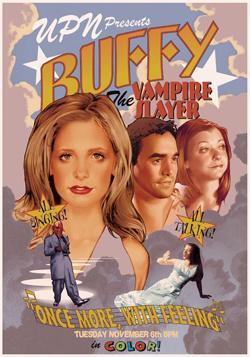Buffy the Vampire Slayer: Once More, with Feeling (TV)

"Once More, with Feeling" is the seventh episode of the sixth season of the fantasy television show Buffy the Vampire Slayer (1997–2003) and the only one in the series performed as a musical. It was written and directed by the show's creator, Joss Whedon, and originally aired on UPN in the United States on November 6, 2001. The premise of Buffy the Vampire Slayer is that an adolescent girl, Buffy Summers, is chosen by mystical forces and given superhuman powers to kill vampires, demons, and other evil creatures in the fictional town of Sunnydale. She is supported by a close circle of family and friends, nicknamed the Scooby Gang. "Once More, with Feeling" explores changes in the relationships of these characters, using the plot device that a demon—credited as "Sweet" but unnamed in the episode—compels the people of Sunnydale to break into song at random moments to express hidden truths. The title of the episode comes from a line sung by Sweet; once the characters have revealed their truths and face the consequences of hearing each others' secrets, he challenges them to "say you're happy now, once more, with feeling". All cast members sang their parts, although two were given minimal lines by request. "Once More, with Feeling" is the most technically complex episode in the series, as extra voice and dance training for the cast was interspersed with the production of four other Buffy episodes. It was Joss Whedon's first attempt at writing music, and different styles—from 1950s sitcom theme music to rock opera—express the characters' secrets in specific ways. The episode was well-received critically upon airing, specifically for containing the humor and wit to which fans had become accustomed. The musical format allowed characters to stay true to their natures while they struggled to overcome deceit and miscommunication, fitting with the sixth season's themes of growing up and facing adult responsibilities. It is considered one of the most effective and popular episodes of the series, and—prior to a financial dispute—was shown in theaters with the audience invited to sing along.